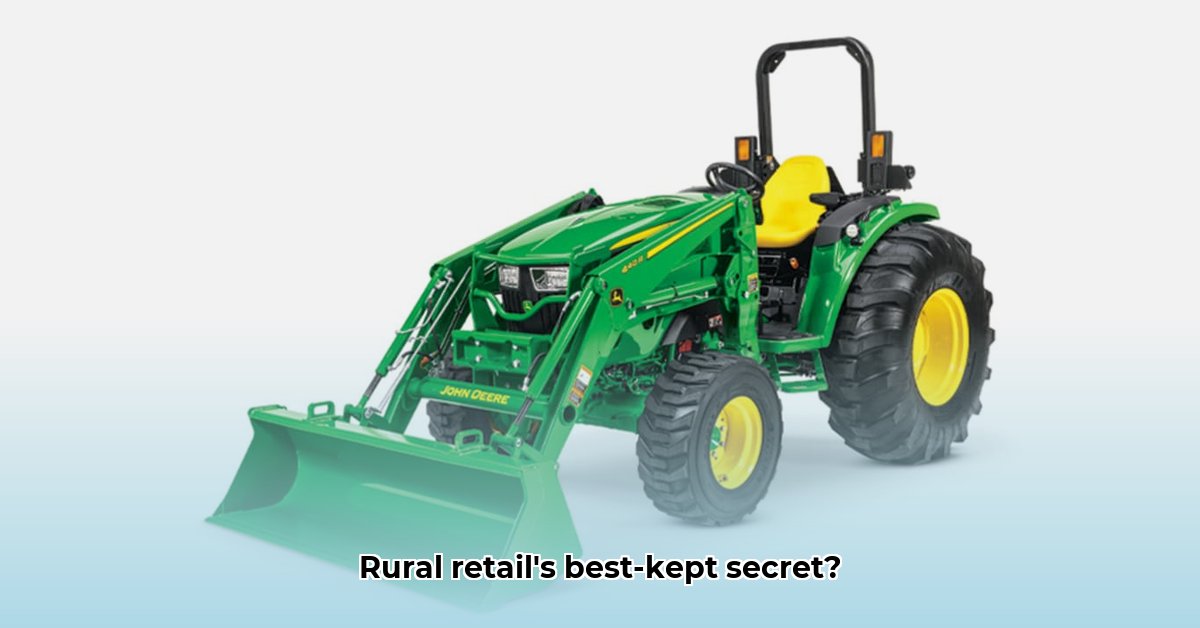
Understanding the Crossville Landscape: A Rural Retail Ecosystem
Crossville, Tennessee, presents a unique blend of rural and modern needs. Its residents—farmers, ranchers, hobbyists, pet owners, and families—require a diverse range of goods and services. This creates a complex retail ecosystem, demanding a retailer capable of adapting to diverse customer needs and preferences. Tractor Supply's presence within this landscape offers a compelling case study in rural retail success. The store's strategic location within the Highland Square Shopping Center provides excellent accessibility, but its overall effectiveness hinges on how well it connects with the community's specific requirements. How successfully does it translate this potential into actual sales and customer loyalty? For similar success stories, see this Glasgow Tractor Supply example.
A Deep Dive into Crossville Tractor Supply: More Than Just Merchandise
Crossville Tractor Supply distinguishes itself as more than a mere retailer; it functions as a community hub. Its success stems from its broad product selection, ranging from farm supplies and livestock feed to pet food, clothing, and home goods. This comprehensive inventory caters to the diverse needs of Crossville residents, effectively functioning as a one-stop shop for many. However, the store's true strength lies in its highly skilled staff. Employees aren't simply transactional; they act as knowledgeable advisors, building strong customer relationships and providing expert advice. This personalized service fosters customer loyalty and differentiates the store from larger competitors. However, to fully understand its efficacy, further quantitative data is required.
Analyzing Strengths and Weaknesses: Data Gaps and Opportunities
A comprehensive evaluation of Crossville Tractor Supply is hampered by a lack of comprehensive quantitative data. Precise sales figures, detailed customer demographics, and a thorough inventory analysis are crucial for a complete understanding of the store's performance. This data deficiency limits the ability to accurately assess the store's strengths and areas for improvement. For instance, while anecdotal evidence suggests strong customer service, concrete data on customer satisfaction levels and repeat business are necessary to definitively quantify this success. Similarly, while the broad product range appears successful, precise sales data per category could inform better inventory management and targeted promotional strategies. Addressing this data deficiency is paramount for future strategic planning. The current success is largely based on intuition and experience; quantifiable data would add rigor to the analysis and provide a more robust foundation for decision-making.
Weathering the Storm: Supply Chain Vulnerabilities and Resilience
The global economy's inherent volatility poses a significant threat to rural retailers like Crossville Tractor Supply. Supply chain disruptions, such as fertilizer shortages, can have cascading effects throughout the local economy. The store's resilience depends on the robustness and flexibility of its supply chain. Strategies for mitigation include diversifying suppliers to reduce reliance on single sources, establishing long-term contracts to ensure consistent product availability, and potentially exploring local sourcing opportunities whenever feasible. A resilient supply chain is not just a cost-saving measure; it is an integral part of long-term viability in a volatile global environment. The capacity of the store to react to and mitigate these disruptions is vital to its long-term survival.
Competitive Landscape: A Tale of Differentiation
Crossville Tractor Supply operates within a competitive landscape that includes both large and small retailers. Maintaining a competitive edge requires a clear differentiation strategy. While the store's broad product range provides a strong foundation, its superior customer service and personalized approach act as crucial differentiators. The focus on building relationships with customers, offering expert advice, and catering to the specific needs of the local community creates a strong sense of loyalty. A deeper understanding of competitors' strategies, pricing, and customer base would allow for a more informed competitive analysis. This thorough understanding could inform more effective strategic positioning and enhance the store's competitive advantage.
Embracing Sustainability: A Path to Long-Term Growth
Incorporating sustainable practices isn't merely an ethical obligation; it's a strategic imperative. Increasingly, consumers demonstrate a preference for businesses that prioritize sustainability. Crossville Tractor Supply can leverage this trend by implementing eco-friendly initiatives. This includes sourcing sustainable products, improving waste management, reducing energy and water consumption, and promoting its commitment to environmental responsibility. Such strategies will not only appeal to a growing segment of environmentally conscious consumers but also enhance the brand's reputation and potentially reduce operational costs in the long term. A detailed assessment of current sustainable practices and opportunities for improvement is necessary to fully realize this potential.
Actionable Recommendations: A Roadmap for Success
The following recommendations are designed to enhance the success of Crossville Tractor Supply and the broader rural retail landscape:
1. Data-Driven Decision Making: Invest in comprehensive data collection to inform strategic decisions regarding inventory management, marketing, and customer service.
2. Supply Chain Resilience: Diversify suppliers and establish long-term contracts to mitigate supply chain disruptions.
3. Enhance Customer Relationships: Continue to focus on personalized customer service and build stronger relationships with the local community.
4. Embrace Sustainability: Implement sustainable practices throughout the store's operations, from sourcing to waste management. Consider offering workshops and events to engage the community in sustainable practices.
5. Competitive Analysis: Perform a thorough competitive analysis to identify opportunities for differentiation and innovation.
6. Community Engagement: Increase community engagement through workshops, events, and participation in local initiatives. This strengthens ties and boosts local loyalty.
7. Technology Integration: Explore opportunities to leverage technology to improve efficiency, customer service, and data collection.
Conclusion: A Model for Rural Retail Excellence
Crossville Tractor Supply serves as a compelling example of successful rural retail. While its current performance is promising, a more data-driven approach and a focused implementation of the recommendations outlined above can further enhance its success and establish it as a model for rural retail excellence. Further research, focused on acquiring the missing quantitative data, will solidify these findings and provide a more comprehensive understanding of the strategies driving its success. The store's ability to adapt to the evolving needs of its community and proactively address emerging challenges is key to its future prosperity.